Today, dear readers, I write you from the brink of an age-old academic quandary.
I will be giving a paper at this year’s ASTR conference. ASTR follows a work-group model rather than a conference-panel model, and this will be my first experience with such. What this means is that every individual in a given work group has written a paper. This paper is sent around to the other individuals in the work group. Everyone in the work group reads all the papers. Then, at the conference, we all sit down and talk about the guiding idea of the panel in hopes of coming to some kind of higher understanding of this idea.
On the whole, I think that this round-table style is much more productive than the

no matter which model a conference goes by, coffee is a necessity. This is a life truism though, rather than a conferencing factoid.
traditional read-and-listen model. What it does mean, however, is that I need to send my paper to a group of academics who have never met me before to read, critique, and be ready to discuss my ideas.
This is an extremely daunting proposition. Compound this with the fact that the work groups consist of a vast range of scholars – from graduate students to department heads. My work group is particularly large and particularly vast in range of experience. There will be people reading my paper who have been in the field much longer than I have and who know much better than I do what they are talking about.
The paper I’m presenting is a paper I wrote for a seminar this semester past. I did a lot of research and put many man hours into this paper. For that, it most certainly needs some work before it can be sent off to aforementioned group of scholars. As I sit here, cradling its pages between my hands like the body of a newborn infant, I am faced with an important decision: To re-write, or to re-vise? That is the question.
William Fualkner famously said of revising, “In writing, you must kill all your darlings” (though he was likely quoting Sir Arthur Quiller-Couch). Stephen King later agreed with him (“Kill your darlings, kill your darlings, even when I breaks your egocentric little scribbler’s heart, kill your darlings” On Writing).
Yes, yes, I know I must be ruthless, but so often I feel like completely scrapping something is the cheater’s way out. While it may seem less time-consuming in the long run, in reality to just burn what I’ve written is to invalidate all the work that I’ve already put into it. So while, at this moment, dashing the brains out of this poor pile of pulp only to allow a bigger, stronger, faster model to emerge from the slurry seems like perhaps the most advisable solution, I have to remember something: I spent a lot of time on this. I edited. I slaved. I wrote and re-wrote. All that time and energy must have produced at least pieces of a finished product.
So, generally, when I’m feeling like just starting over would be best, I take a moment to recall the hellish process of editing. I allow myself a moment of silence for the many many stacks of pages of drafts that were fed to my fireplace. And then I realize that no, there must be something in here worth saving.
I start with my abstract. I go through it and write myself a clear logic train. A rhetoric map. “Fact: X. Fact: Y. Following in this progress, you reach my inevitable conclusion which is Z.”
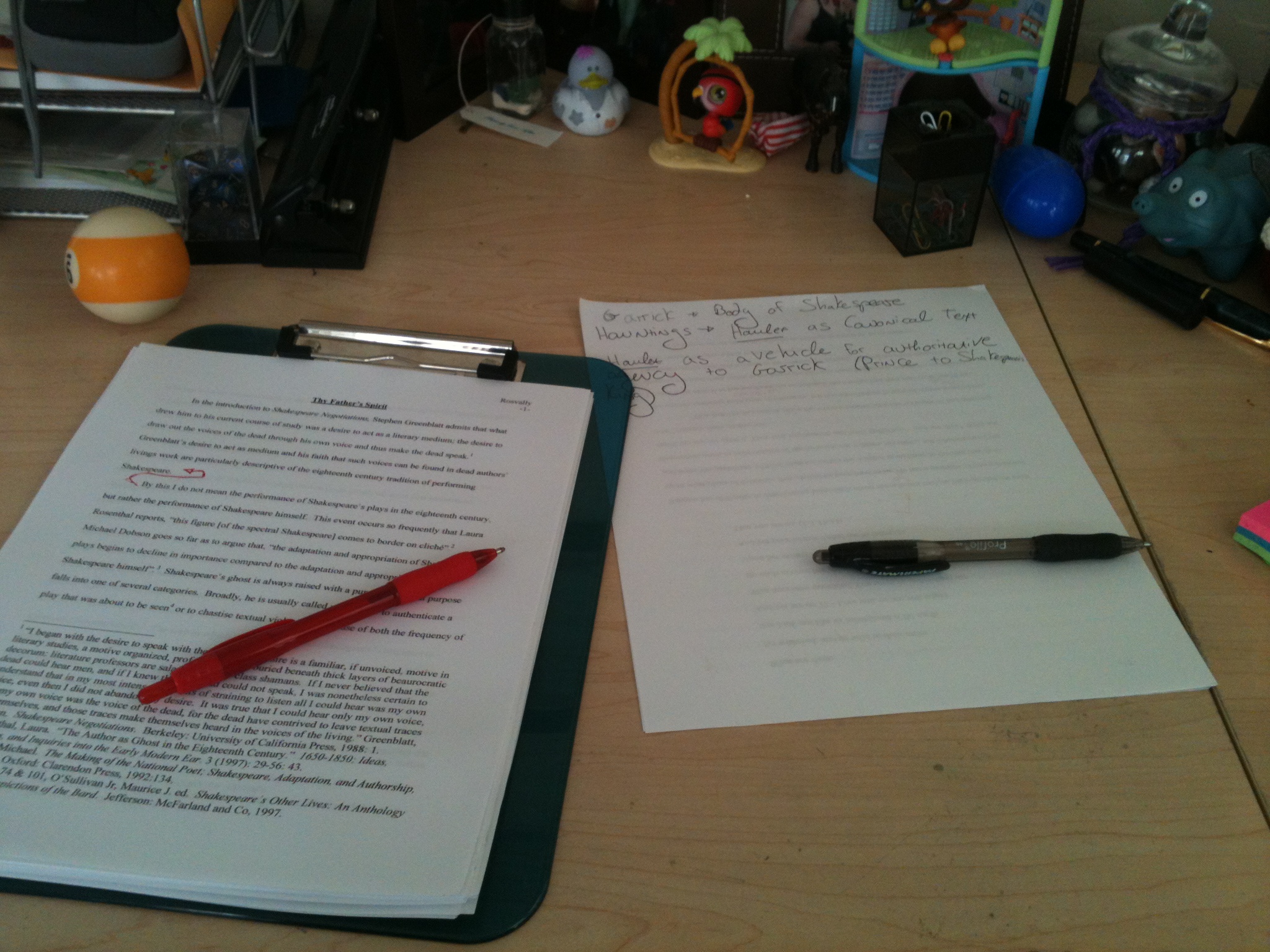
abstract outline on right, prep to red-pen on left
Then I proceed into a harsh red-penning of my previously-produced paper. What do I absolutely need? What can go? Ignoring the length of the final paper, I cut and slash my way through the prose jungle until I’ve boiled things down to their essence.
Then I take those bits and I re-arrange them. Sometimes I physically cut and move them around on a table until I have something that makes sense.
Then I reverse-outline what it is I’ve wound up with. I boil things down to topic sentences; what am I saying? When am I saying it?
I compare the reverse outline to my rhetoric map to discover where my holes are. Do I need a bit more research on weird fact B? Do I need to explain logic leap C a bit better? What do I need to do to ensure that we all wind up smoothly at the station of my final destination?
Then I set to work. Sometimes this involves more research; a trip to the library, some ILL articles. Sometimes this just involves a few days in the bunker holed up with my previous research and a fully loaded French press.
Then, a few drafts later, I have something. It’s very different from what I started with.
Then come the external eyes. Always always vet your writing by an outside party if you can possibly manage it. Work out paper-shares with folks in your department. Find a friend willing to proofread in exchange for dinner. The more outside eyes you can have on a piece, the stronger it will become.
After this step, I generally have to go back in for a draft or two and adjust a few things – generally not a complete overhaul at this stage since I’ve already spent so much time living with the paper.
And then I have something. Is it finished? Well, it will never be finished. But at least it’s evolved.
So that’s what I’m facing down now. The next step in the evolution of a paper.
Well, hey hey and away we go.



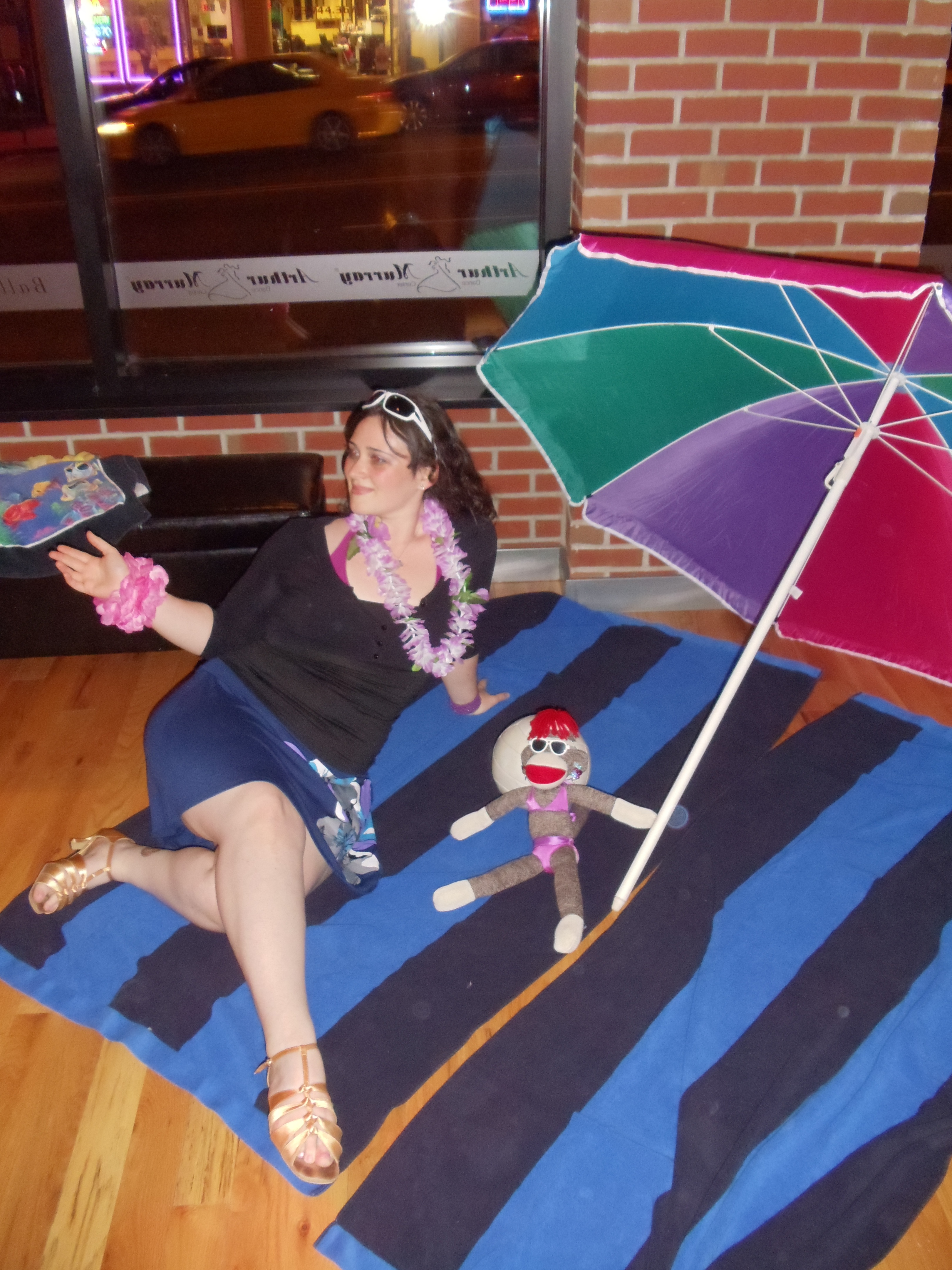
 in-able. I’ve totally been over this before. At some point between preliminary vomit draft and pristine turn-it-in paper, I hit what I like to call the “mid-draft slump”. It’s that point in the paper-writing process where you look at the mess you’ve made, you look at the work you’ve done, and it hits you: this is completely inane. You haven’t produced anything of value; you’ve barely produced anything. In fact, all this research you just did is pretty much garbage because it hasn’t led you anywhere. You’re not saying anything original; you’re not saying anything at all.
in-able. I’ve totally been over this before. At some point between preliminary vomit draft and pristine turn-it-in paper, I hit what I like to call the “mid-draft slump”. It’s that point in the paper-writing process where you look at the mess you’ve made, you look at the work you’ve done, and it hits you: this is completely inane. You haven’t produced anything of value; you’ve barely produced anything. In fact, all this research you just did is pretty much garbage because it hasn’t led you anywhere. You’re not saying anything original; you’re not saying anything at all.
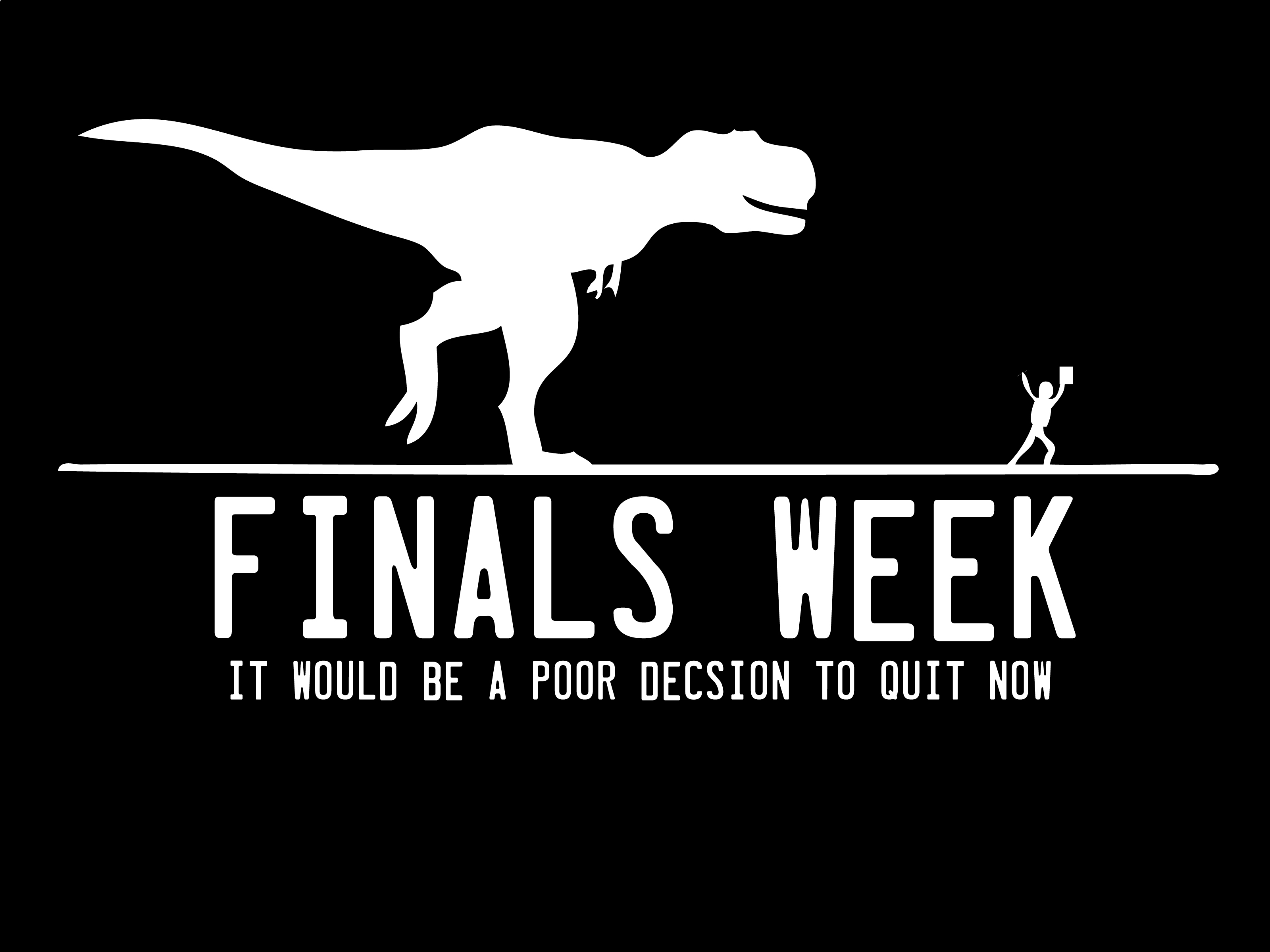 Do whatever you need to do to keep yourself in the red. Dance, throw stuff, run around, keep going, dip into the deep part of yourself where you store the bits that you don’t generally access and use those to fuel whatever it is you are doing until it’s done.
Do whatever you need to do to keep yourself in the red. Dance, throw stuff, run around, keep going, dip into the deep part of yourself where you store the bits that you don’t generally access and use those to fuel whatever it is you are doing until it’s done.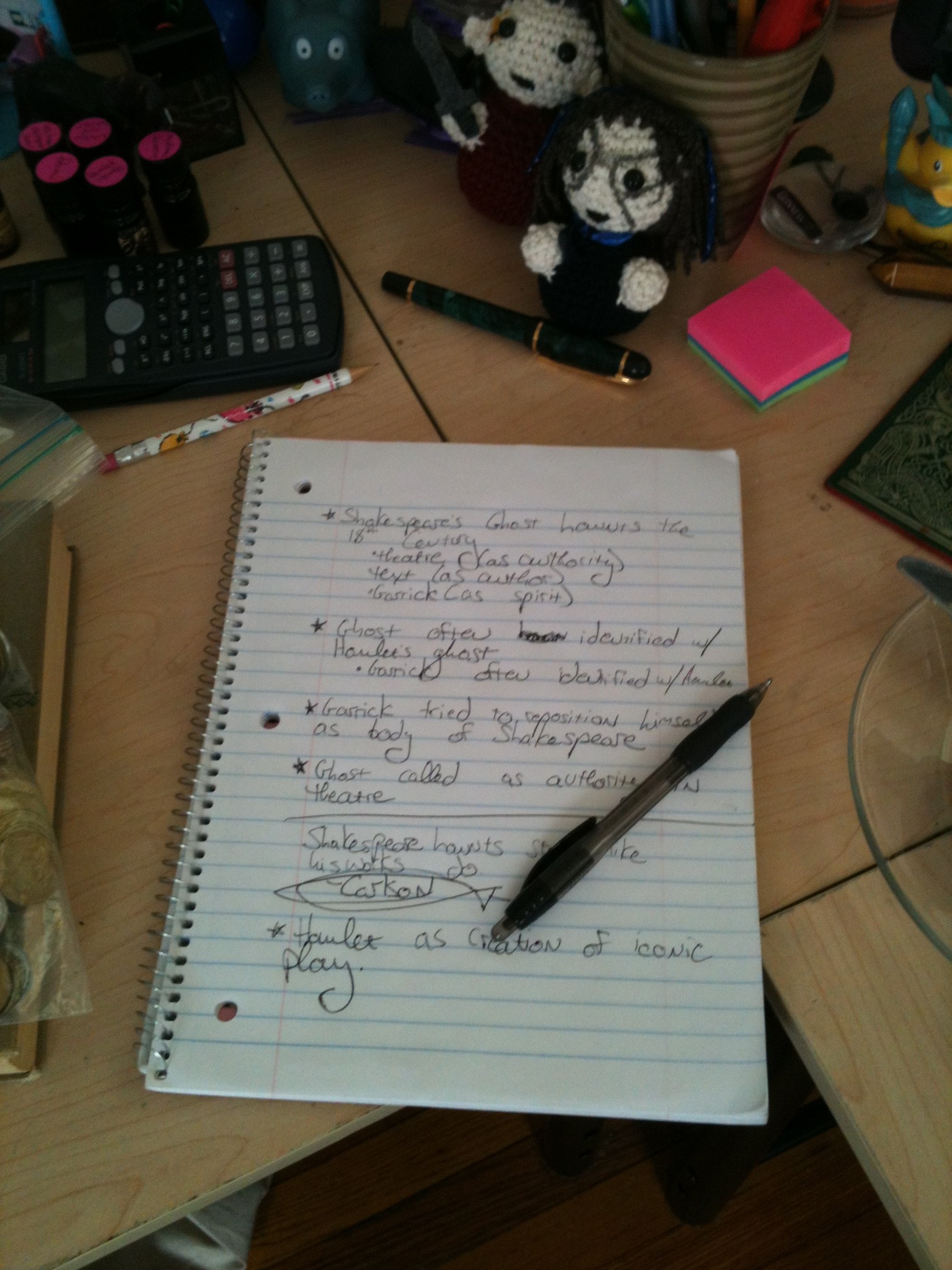



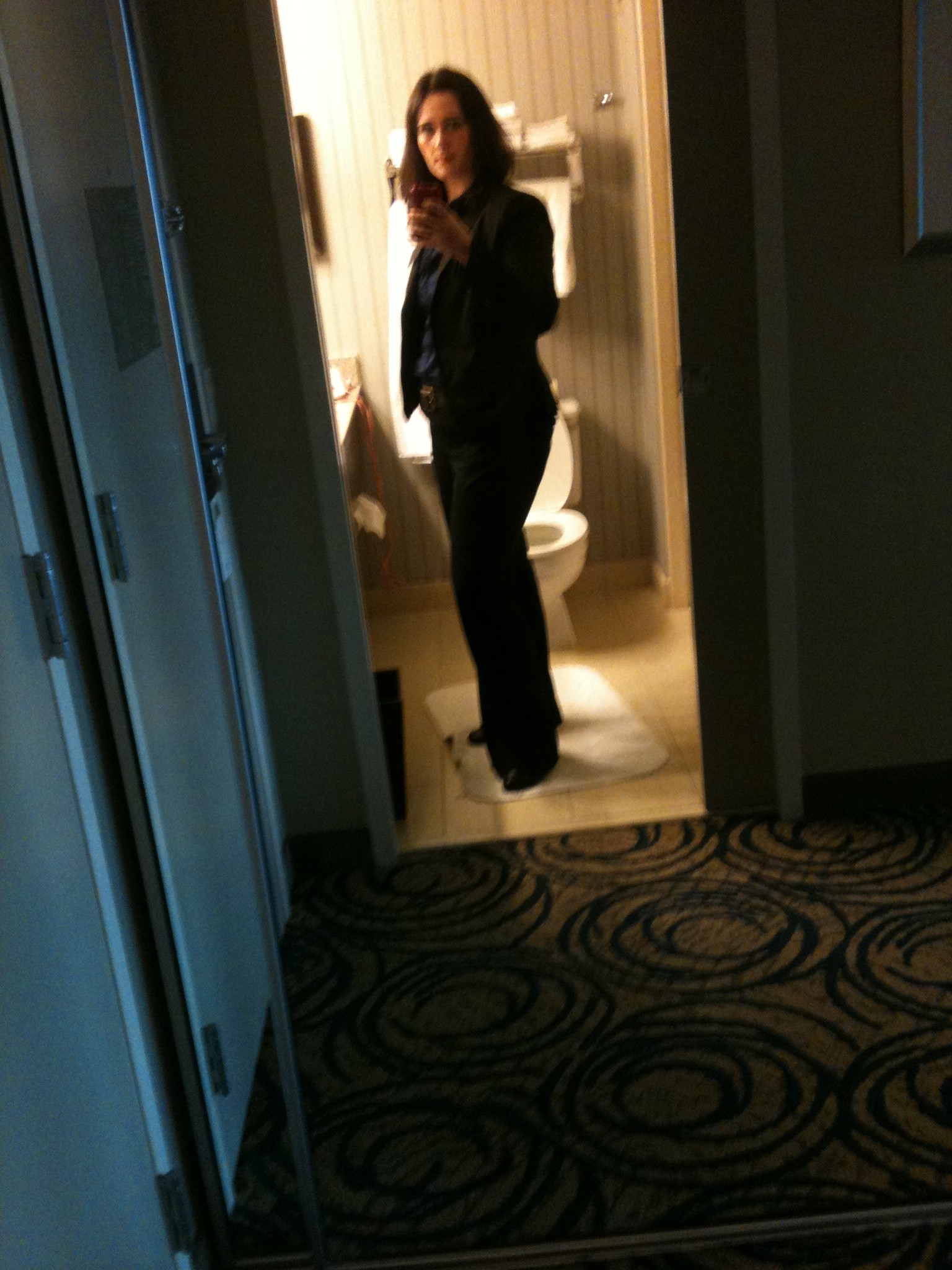

 The worst part is that idea conception is probably one of my favorite bits about academia. The creative spark is something that, as an artist, I’m always excited about. There’s nothing quite like that moment when the lightbulb flicks on and a single idea snowballs into something feasible, even more interesting than you had initially thought, and something which you’re excited to share with the world at large (or at least your colleagues… or at the very least your professor). I’ve been fascinated in recent years by the idea of structured creativity; the sort of artistry that an academic can bring to one’s work.
The worst part is that idea conception is probably one of my favorite bits about academia. The creative spark is something that, as an artist, I’m always excited about. There’s nothing quite like that moment when the lightbulb flicks on and a single idea snowballs into something feasible, even more interesting than you had initially thought, and something which you’re excited to share with the world at large (or at least your colleagues… or at the very least your professor). I’ve been fascinated in recent years by the idea of structured creativity; the sort of artistry that an academic can bring to one’s work.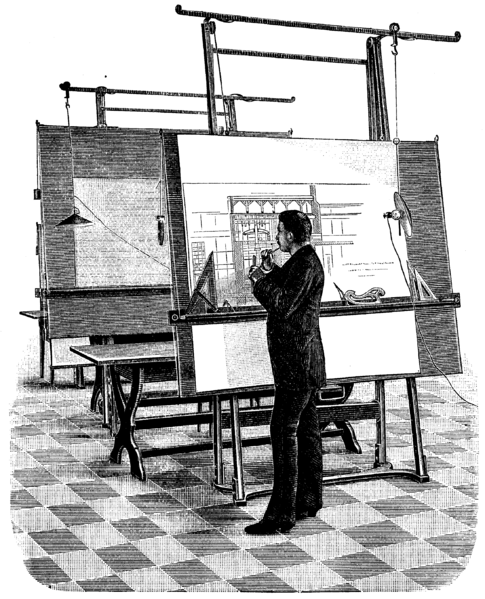


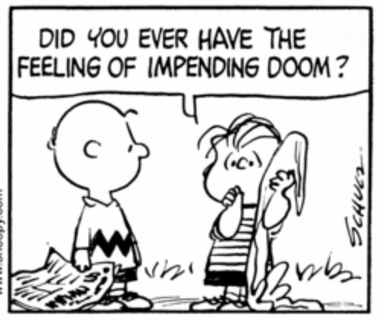 I’m thick in the drafting process of two papers, the third is still broiling on the back-burner and will need to be drafted in the next week. As such, I feel like I’m riding a roller coaster of textual uncertainty. The highs, the lows, the long nights with the firm knowledge that my martini glass is the only thing in the world that understands me. It really makes me feel alive. And by “alive” I mean exhausted on every possible level; physically, mentally, and emotionally. Just a heads up, if the world has something important or potentially spirit-crushing or even slightly unpleasant to tell me, it should wait a few weeks. Telling me now will only warrant a sure-fire over-reaction resulting in shouting, tears, physical violence, or potentially all of the above.
I’m thick in the drafting process of two papers, the third is still broiling on the back-burner and will need to be drafted in the next week. As such, I feel like I’m riding a roller coaster of textual uncertainty. The highs, the lows, the long nights with the firm knowledge that my martini glass is the only thing in the world that understands me. It really makes me feel alive. And by “alive” I mean exhausted on every possible level; physically, mentally, and emotionally. Just a heads up, if the world has something important or potentially spirit-crushing or even slightly unpleasant to tell me, it should wait a few weeks. Telling me now will only warrant a sure-fire over-reaction resulting in shouting, tears, physical violence, or potentially all of the above.